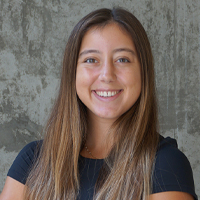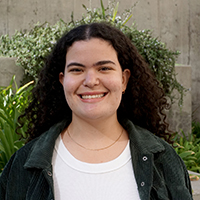Peer Advising
The College of Arts & Letters at San Diego State University (SDSU) offers a comprehensive Peer Advising program designed to support students exploring CAL majors and minors.
Our peer advisors are committed to assisting you in understanding academic requirements, selecting appropriate courses, and making informed decisions about your educational journey.
Peer advisors are available to help Economics and Sociology majors and minors with:
- Exploring major and minor requirements.
- Understanding course options and sequences.
- Discussing academic pathways within the major.
Meet Your Economics Peer Advisor
Thinking about switching your major or adding a minor in Economics?
Advising appointments with Mari are available for students exploring a change to the Economics major or minor.
Whether you're curious about program requirements, career pathways, or how to get started, Mari is here to help you make an informed decision.
 Marianthe “Mari” Tsirelas
Marianthe “Mari” Tsirelas
Major: Economics – Quantitative Analysis
Book your appointment today with Mari.
Meet Your Sociology Peer Advisor
Considering a major change or adding a Sociology minor?
You can book an advising session with Ines to explore your options in the Sociology program.
Whether you want to understand degree requirements, learn about career possibilities, or figure out your next steps, Ines is here to support you in making the right choice for your academic journey.
 Ines Laimeche
Ines Laimeche
Major: Sociology
Book your appointment today with Ines.
 Emma Powell
Emma Powell
B.A. in English (2025)
Single Subject Teaching Credential in English
About the Program
Serving as a peer advisor offers numerous benefits that contribute to personal and professional development:
- Enhanced Leadership and Communication Skills: Peer advisors develop valuable leadership and communication abilities, learning strategies to improve student success.
- Increased Self-Knowledge and Academic Proficiency: The role allows peer advisors to deepen their understanding of academic requirements and course content, reinforcing their own knowledge.
- Professional Development Opportunities: Peer advisors receive training in university policies, student services, and academic resources, gaining paraprofessional advising experience.
- Building Professional Networks: Engaging with faculty advisors and other peer advisors expands professional connections.
Interested in becoming a peer advisor with CAL? Please contact Dr. Deborah Gordon at [email protected].
